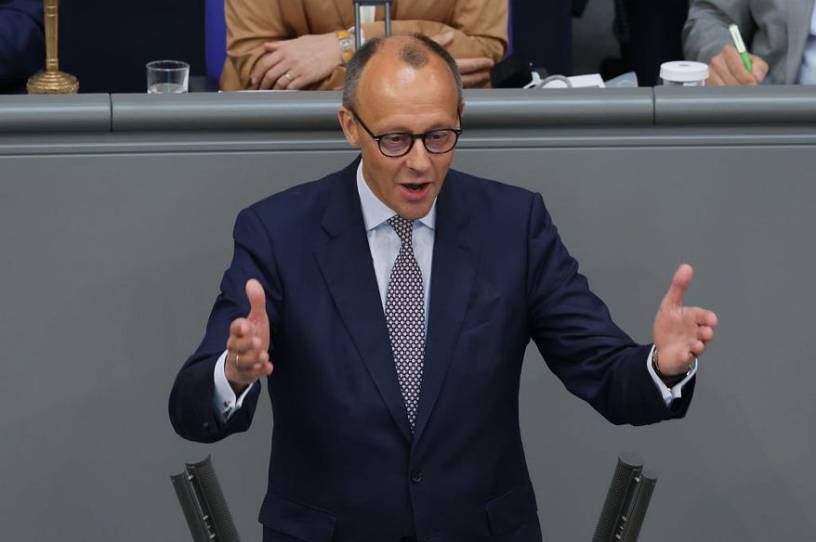German Leaders Are Out of Touch on Ukraine. One Politician Is Forcing Their Hand.

When Russia invaded the Crimean peninsula in February 2014, the swift conquest assured that Vladimir Putin could make the trip to the recently annexed territory for Victory Day on May 9 of that year. The day marks the victory of the Red Army against Nazi Germany in World War II, but also serves to underline Russia’s military power. Given that the current invasion of Ukraine started in February, it isn’t far-fetched to believe that Putin once envisioned himself standing in what he would consider a “liberated” Ukraine on Victory Day. However, despite a long-awaited clue about the direction of the war, Putin’s speech in Moscow revealed little about the autocrat’s plans.
It’s now impossible to imagine Putin appearing in Kyiv anytime soon, if ever. But one of the biggest public relations victories for Ukraine has been the steady stream of Western leaders visiting with Ukrainian President Volodymyr Zelensky in recent weeks: U.K. Prime Minister Boris Johnson, U.S. Secretary of State Antony Blinken and Defense Secretary Lloyd Austin, the foreign ministers of Poland, Slovenia and the Czech Republic; and others.
Germany is noticeably absent from that list, but that could soon change. Zelenksy had previously said that German President Frank-Walter Steinmeier wasn’t welcome; the chilly relations stemmed from the fact that Steinmeier and German Chancellor Olaf Scholz, both Social Democrats, have long pushed for closer ties to Russia, particularly on energy, and have been ambivalent about a Russian energy embargo. But Ukraine’s president reversed himself and invited the pair last week.
Now that moves towards a comprehensive embargo have been more promising on the European Union level, Zelensky’s invitation—which German leadership will eventually be politically forced to accept—is taunting the Russians, who celebrate a Victory Day without victory to show for.
The man in the background who convinced Zelensky to reconsider an invite is Friedrich Merz, leader of the German Christian Democratic Union, the main opposition party. Merz had long been an intraparty opponent of former Chancellor Angela Merkel—running against her for CDU leader before her 16-year reign as chancellor—and she had worked inside the Christian Democrats to prevent him succeeding her. Her eventual successor, Armin Laschet, resigned after being monumentally defeated in the elections last year, paving the way for Merz’s return.
Before the CDU lost so many seats in the last election, its members had seen Merz as too fiscally conservative on social welfare, afraid it would lose to the Social Democrat-led opposition to Merz’s pro-business policies. But he also had no fans among Russia’s state broadcast off-shoot RT Germany in 2018, described Merz as a “social darwinist and lobbyist of the big capital,” arguing that his cronies would pour into Berlin if he were to take over.
Russia’s skepticism toward Merz has proved well-advised because last week, he tweeted: “I am very grateful to President Zelensky for accepting my request for an invitation for the Federal President. The way is clear for personal meetings between the Federal President and the Federal Chancellor and President Zelensky in Kyiv.”
Merz visited Ukraine a week ago and met Zelensky, itself a striking political blow to the authorities in Berlin. In an April poll, a plurality of respondents (45 percent) said that Germany’s response to the war in Ukraine was not sufficient. That number has gone up: In a more recent poll, 57 percent were either “disappointed” or “in complete disagreement” in Scholz’s leadership.
Friedrich Merz is capitalizing on the ambiguity of the German government over Russia’s aggression. Germany had first refused all arms deliveries to Ukraine, and even attempted to block those of fellow NATO allies. It then delivered heavy arms and promised to up its military budget to meet the alliance’s 2 percent target for military spending. What exactly Germany’s view on a Russian energy embargo is remains unclear—despite statements from the government that give the impression that Berlin believes it can forgo Russian imports in the near future.
Germany’s majority parties have accused Merz of scoring cheap political points ahead of the election in North-Rhine Westphalia, Germany’s most populous state, where Merz’s CDU and Scholz’s SPD are neck-and-neck in the polls. Point-scoring or not, the German opposition leaders express the sentiments of an increasing part of the German electorate, which is that Scholz’s leadership is too dovish toward Moscow.